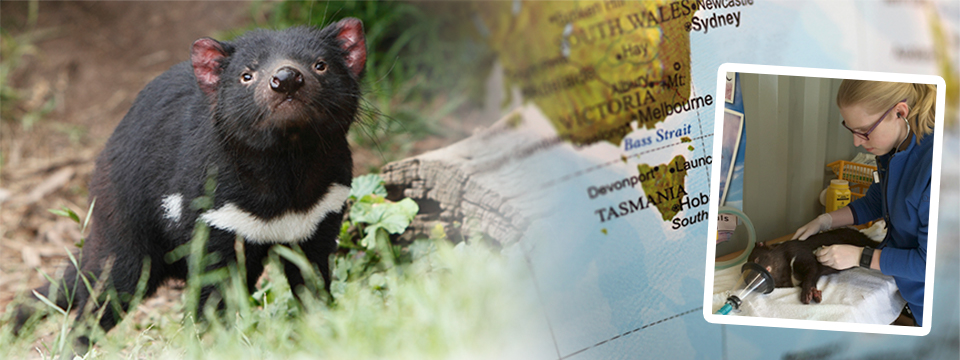
It was her last free summer in veterinary school, and Jessica Elbert (’18) wanted to do something impactful. In the course of her studies, she had become extremely interested in transmissible cancers, especially devil facial tumor disease (DFTD).
Elbert couldn’t think of a better way to spend the summer than working on this important disease. Not finding any summer research internships on DFTD, Elbert decided to make her own. She contacted the Save the Tasmanian Devil Program (STDP), based in Hobart, Tasmania (Australia), about doing an internship under their guidance, and devised a ten-week, self-directed internship.
In May 2016, Elbert flew to Tasmania for the summer. There, she worked with the program’s veterinarians and researchers. “My time in Tasmania was extremely varied, ranging from conducting molecular biology work to aid in DFTD drug and vaccine development, assisting with general veterinary care with STDP’s captive population of devils, to devising monitoring protocols for Dasyurotaenia robusta, an endangered cestode found only in Tasmanian devils,” Elbert said. “I also participated in an extensive 10-day monitoring field trip where we caught 110 devils and 20 quolls. That number doesn’t include the multiple recaptures of animals that wanted the lamb bait day after day!”
During the field trip, Elbert and the researchers didn’t detect DFTD in the area (a good thing), but “I enhanced my devil venipuncture skills and learned safe devil handling,” said Elbert.
An admitted pathology enthusiast, Elbert most enjoyed time spent at the Animal Health Laboratory (AHL) in Launceston, Tasmania, which is the diagnostic pathology laboratory that services the state of Tasmania. Elbert worked closely with Dr. Jim Taylor, AHL’s principal veterinary pathologist and ISU alum (M.S. Veterinary Pathology, 1980). “I was able to assist in postmortem and histological exams of animals ranging from redfin perch to neonatal lambs and calves, to spotted-tail quolls, wallabies and Australian fur seals.” Elbert also performed her first solo post-mortem on a Tasmanian devil, and discovered an olfactory bulb neoplasm in a devil which she is classifying for future publication with Dr. Jodi Smith, veterinary pathologist in the College of Veterinary Medicine.
“It was an incredible internship,” Elbert said. “I had many diverse experiences, worked alongside fantastic individuals and learned a tremendous amount of information about DFTD and Tasmanian devils.”
Elbert advises students, “If you have a passion about a particular topic or animal, and there isn’t a formal internship or preceptorship, take the initiative to develop your own experience. It’s well worth the effort.”
November 2016
